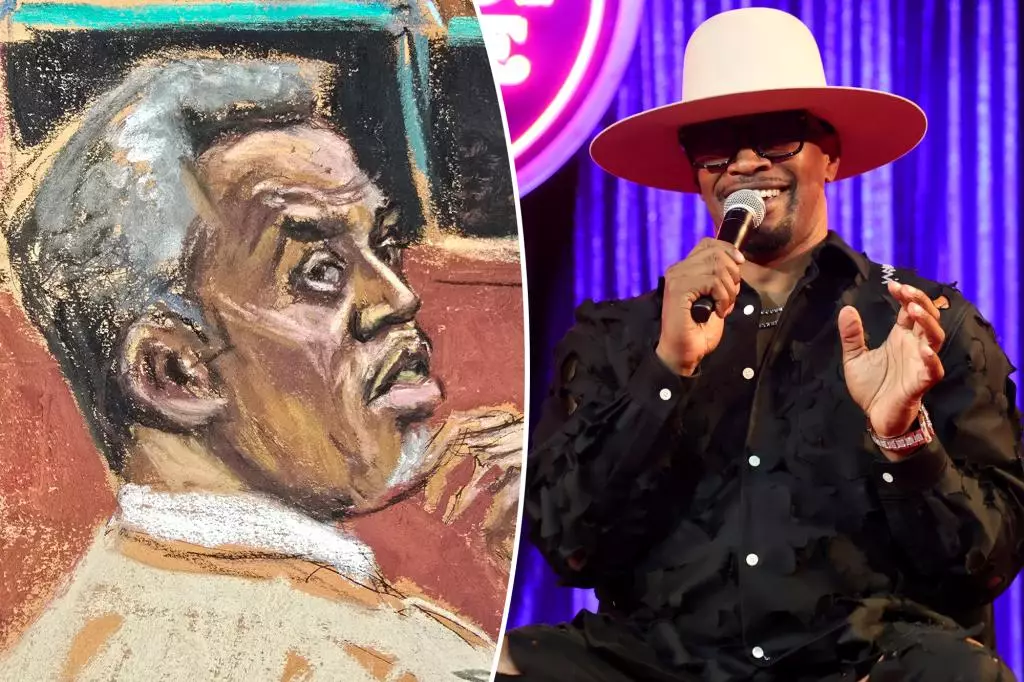In an era when the lines between celebrity admiration and personal consequence are increasingly blurred, comedian Jamie Foxx’s recent roast of Sean “Diddy” Combs stands out as a stark reminder of the dangerous underbelly of fame. During a performance at The Comedy Store in West Hollywood, Foxx expressed shocking revelations surrounding Combs’ ongoing sex-trafficking trial, which has captivated and horrified audiences alike. With a pointed wit, Foxx underscored how the actions of a public figure can ripple through a community, transforming icons into cautionary tales.
Foxx, while balancing humor and gravity, pointedly commented on the trajectory of Combs’ reputation. “That Diddy s–t crazy, huh?” he quipped, setting the stage for his critique. The fallout from Combs’ trial is more than a celebrity scandal; it embodies a profound sense of betrayal among his supporters, particularly within the Black community. The juxtaposition of Diddy’s once-celebrated legacy against the backdrop of horrific allegations illuminates not only the personal disgrace of the man but also raises critical questions about the cultural icons we lift up and venerate.
Exposing the Layers of Comedy and Pain
One particularly jarring incident mentioned by Foxx involved Combs’ ex-girlfriend Cassie Ventura, and disturbingly graphic allegations she made about Combs’ sexual conduct. “Why you so nasty, Diddy? Old nasty motherf—ker,” Foxx remarked, blending humor with a poignant critique that lay bare the alarming reality of Combs’ alleged transgressions. This is no longer about merely roasting a once-cherished figure; it’s about shining a spotlight on the damaging behavior that can thrive behind the glitz and glamour of celebrity.
Foxx’s commentary serves as a double-edged sword. While it offers an outlet for laughter, it also forces the audience to grapple with the uncomfortable truth: that the very people who dominate our airwaves and inspire us might also be perpetrators of heinous acts. Humor in this context becomes a mechanism for catharsis and a form of social critique, propelling the audience to reconsider their connection to celebrity culture.
Fame and its Fallout
Combs’ trial epitomizes the harsh realities that often lurk beneath fame. With charges ranging from racketeering conspiracy to sex trafficking, the case acts as a sobering reminder of how power can corrupt and mask moral culpability. Jamie Foxx’s assertion that Combs’ behavior damages the collective psyche of the Black community cannot be overstated. Through the lens of comic relief, Foxx calls for introspection about the figures we choose to idolize and the implications of their actions.
The challenge lies in reconciling the music and memories associated with these personalities against the backdrop of their misdeeds. Can one continue to enjoy the beat of “It’s All About the Benjamins” knowing the man behind it is facing serious allegations of exploitation and abuse? The internal conflict this creates is troubling, forcing fans to reconsider what loyalty means in the face of such significant moral failings.
From Laughter to Awareness
Foxx’s performance pushes the boundaries of how we consume celebrity news. It encourages a dialogue about accountability and the protective armor that fame often affords to its wielders. In his comedic approach, Foxx compels audiences to transition from mere observers of a scandal to active participants in a larger conversation about morality and responsibility.
Moreover, Jamie Foxx’s own recent health scare adds a layer of context. His battle with a brain bleed and the misinformation surrounding it is a sharp reminder that celebrities are human beings subject to frailties, health crises, and the fallout of their choices. This intertwining of personal adversity with public scrutiny further complicates the narrative as Foxx himself has navigated the tenuous nature of life in the limelight.
In dissecting these intertwined narratives, we should reflect on the greater implications of celebrity culture: its capacity to inspire and yet, when misused, to devastate the very communities that celebrate it. Foxx’s cutting humor isn’t just entertainment; it’s an essential push against the veil of ignorance that often clouds our understanding of who we idolize.

